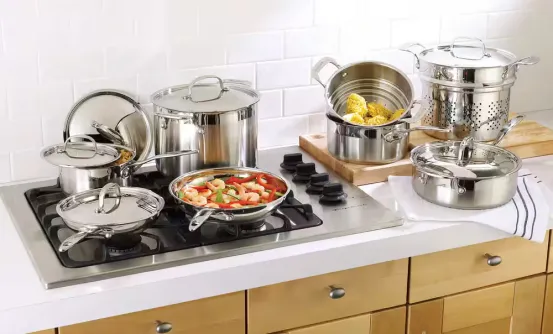
Whether you are an experienced chef or a home cook who loves cooking, 스테인리스 스틸 조리기구 has become a popular choice because of its durability, versatility, and beauty. Now that you have chosen the right cookware, you also need to explore and understand their usage guidelines to better achieve cooking success. In this article, Allnice will explore everything you need to know about cooking with 스테인리스 스틸 조리기구. Let’s get started!
Understanding 스테인리스 스틸 조리기구
Stainless steel is an alloy composed mainly of iron, with varying amounts of chromium and nickel. This composition makes it durable, corrosion-resistant, and non-reactive, making it an ideal choice for cooking a variety of dishes. Compared to other materials such as aluminum or copper, stainless steel cookware is less reactive with acidic foods during cooking, ensuring that food retains its original flavor.
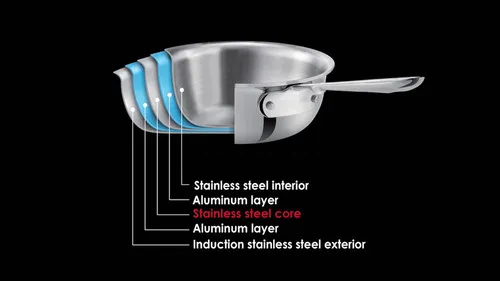
Preparation for cooking with stainless steel cookware
Initial cleaning and seasoning tips
Remove packaging and labels: Make sure there are no packaging or labels on the cookware that may interfere with the cooking process or cause unnecessary fumes. Wash the cookware thoroughly with a mild detergent and warm water. Avoid using harsh detergents or abrasives that may damage the surface of the stainless steel cookware. Rinse the detergent and dirt thoroughly with clean water, ensuring that no detergent residue is left. Some chefs recommend heating a small amount of oil in the pan to season the stainless steel before first use to create a natural non-stick surface. This initial seasoning helps improve the performance of stainless steel cookware and prevents food from sticking.
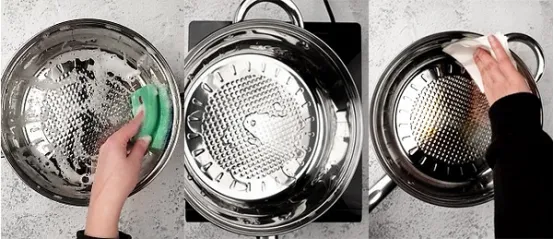
Understanding the thermal conductivity and hot spots of stainless steel cookware
Because stainless steel conducts and retains heat very well, any food that comes into contact with an overheated pan is more likely to burn. Stainless steel cookware is generally able to distribute heat evenly, which helps food cook evenly across the entire surface and avoids overcooking or undercooking parts of the food. However, if preheating is not done properly, hot spots may occur. Preheating the cookware before adding ingredients ensures even cooking and reduces the likelihood of food sticking to the surface.
Choose the right size and shape of stainless steel cookware for your cooking needs
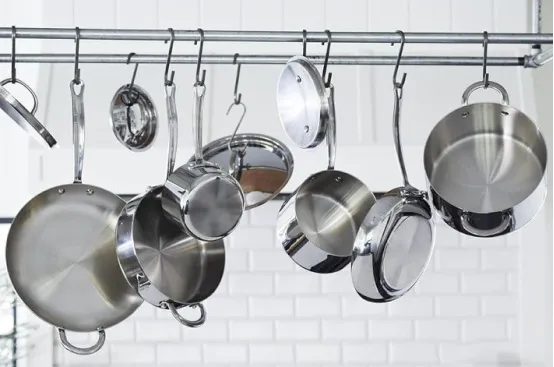
By choosing the size and shape of stainless steel cookware, you can meet your cooking needs more effectively and enjoy a better cooking experience and food quality. Choose the size of cookware based on the number of people in your family and the amount you usually cook. Consider the type of dishes you want to cook. For example, stir-frying usually requires a larger pan to fully flip the ingredients, while stewing may require a deeper pot. Choosing the right size and shape of stainless steel pots depends on your cooking habits and the size of your home or restaurant.
Cooking tips for using stainless steel cookware
When using stainless steel cookware for stir-frying, frying, boiling, and stewing, as well as baking and roasting, some specific tips and advantages can help you achieve the best cooking results.
Stir-frying and frying: tips to prevent sticking
- Proper preheating: Ensuring that the stainless steel cookware is fully preheated can help reduce the possibility of food sticking to the pan. Add oil after preheating, and add ingredients when the oil is slightly smoking.
- Use the right amount of oil: During stir-frying and frying, the right amount of oil helps to form an even lubrication layer, reducing direct contact between food and the bottom of the pan, thereby reducing the risk of sticking.
- Avoid over-stirring: Try to minimize the number of times you stir during the cooking process so that the ingredients form a golden crust on the bottom of the pan, which can also reduce the possibility of food sticking to the bottom of the pan.
- Control the heat: Stainless steel cookware transfers heat quickly, and the heat needs to be adjusted in time to prevent food from burning or sticking due to excessive temperature.
Boiling and stewing: Taking advantage of stainless steel
- Even heating: Stainless steel cookware distributes heat evenly, which is particularly useful when boiling and stewing, ensuring that food is evenly heated across the entire surface and avoiding overcooking or undercooking.
- Preserving the original flavor of ingredients: Stainless steel does not release any non-food components into food during normal use, which makes it particularly suitable for boiling and stewing dishes that require long cooking times, preserving the original flavor and nutrients of ingredients.
- 내구성: Stainless steel cookware is durable and can withstand long-term high-temperature cooking without easily deforming or breaking.
Baking and roasting: Safe practices for stainless steel cookware in the oven
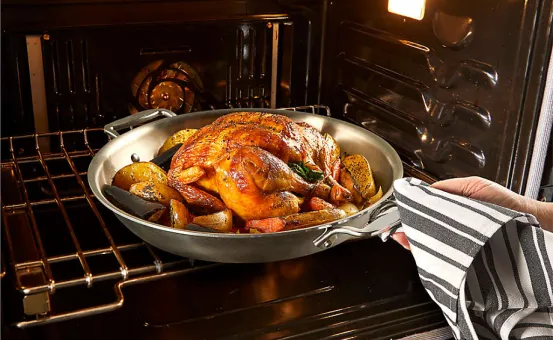
- Use oven-safe stainless steel cookware: Make sure the cookware is marked as suitable for oven use, and stainless steel cookware can usually withstand high temperatures.
- Pay attention to cooking time and temperature: Adjust the oven temperature and cooking time according to the recipe instructions to ensure that the food is heated evenly and not over-burned.
- Use heat-insulated handles: If possible, choose stainless steel cookware with heat-insulated handles to make it safer to remove the cookware from the oven.
How to maintain stainless steel cookware
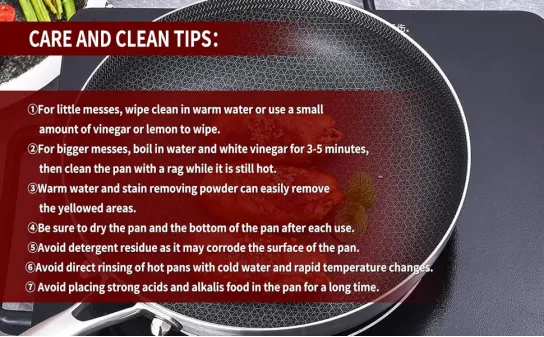
Proper cleaning tips to keep stainless steel cookware shiny
Use mild detergent and warm water to clean stainless steel cookware. Avoid using abrasives or strong acidic cleaners to avoid scratching or corroding the stainless steel surface. Choose a soft cloth or non-metallic sponge to wash to prevent scratching the stainless steel surface. After rinsing, wipe the stainless steel surface with a clean soft cloth or paper towel to prevent water stains or scale from being left.
Dealing with stainless steel cookware stains and discoloration
If stains or scales appear on the stainless steel surface, you can use white vinegar or lemon juice for a light decontamination treatment. Apply white vinegar or lemon juice to the stains, let it sit for a while, and then wipe with a soft cloth. Stainless steel cookware may discolor due to long-term high-temperature cooking. You can try to remove the discoloration with a special stainless steel cleaner or stainless steel care product. It is also necessary to avoid burning stainless steel cookware empty or exceeding the recommended temperature, which will help reduce the possibility of surface discoloration.
Long-term care and storage tips for stainless steel cookware
Regularly using stainless steel care products or cooking oil, gently applied to dry stainless steel surfaces, will help maintain the shine and resist rust. Clean and dry cookware thoroughly after use, making sure it is completely dry before storing, and avoid storing in damp or humid environments.
요약
Stainless steel cookware is a must-have for professional and home kitchens. Whether it’s stir-frying vegetables, grilling steaks, or stewing soup, stainless steel cookware is suitable for almost any cooking method. Now that you know how to cook with stainless steel cookware, check out our full range of stainless steel pots, pans, and cookware sets to see how much of a difference chef-favorite cookware can make to your daily cooking. At the same time, as a stainless steel catering supplier for many years, we have rich experience in providing 맞춤형 서비스 그리고 e-commerce services, please 문의하기 to learn more.
